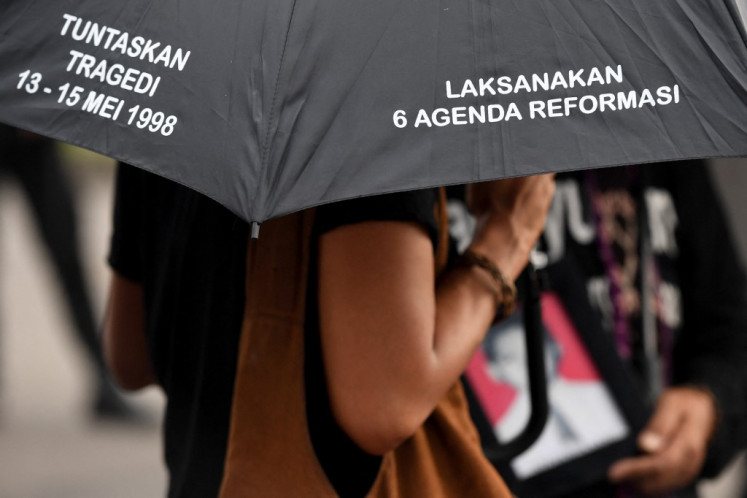Popular Reads
Top Results
Can't find what you're looking for?
View all search resultsPopular Reads
Top Results
Can't find what you're looking for?
View all search resultsBull market will continue, JCI to gain 17 percent
The bull market will continue this year as improvements in the countryâs economic conditions resulting from the sharp drop in oil prices and the removal of costly fuel subsidies will bring more confidence to investors, an analyst has said
Change text size
Gift Premium Articles
to Anyone

The bull market will continue this year as improvements in the country's economic conditions resulting from the sharp drop in oil prices and the removal of costly fuel subsidies will bring more confidence to investors, an analyst has said.
Panin Asset Management president director Winston Sual said on Tuesday that the entry of fresh funds into the market would push up stock prices, particularly those of the banking and consumer goods sectors.
He estimated that the Jakarta Composite Index (JCI) ' the main price barometer at the Indonesia Stock Exchange (IDX) ' would grow by about 17 percent to 6,200 at year-end from last year's closing level of 5,227. The JCI gained 20 percent last year.
Winston said that decreasing oil prices, which have dropped about 50 percent since early last year to about US$50 per barrel at present, would become the major factor in streaming liquidity and pushing the index up this year.
'The decreasing oil prices come simultaneously with the government's move to slash fuel subsidies, thus are expected to ease burdens in our current account. We project that the country might start recording a surplus in the current account by the end of the year,' he said, sharing his optimism.
Oil prices fell to the lowest level since 2009 last month as the US pumped the most in three decades and the Organization of Petroleum Exporting Countries (OPEC) kept its own supplies unchanged to defend its share of the global market. Prices at the West Texas Intermediate (WTI) have decreased 11 percent this year, Bloomberg reported.
The low oil price, he said, was favorable for the country as it comes in line with President Joko 'Jokowi' Widodo's decision to remove almost Rp 200 trillion (US$16 billion) in fuel subsidies from the state budget.
With an estimated improvement in current account, Winston said that his asset management projected that the banking and consumer sectors would outshine other sectors in stock trading.
'We estimate that the banking and consumer indexes will be the two sectors that enjoy the most growth this year thanks to an anticipated increase in the country's liquidity, as there is an expected boost in money channeled by banks as well as consumer spending,' he said.
The JCI closed at 5,291.72 on Tuesday, up by 0.29 percent from the day earlier and 1.24 percent year-to-date.
Meanwhile, Mandiri Institute executive director Destry Damayanti warned that the US central bank's plan to raise interest rates in the middle of the year might cause capital outflow from the country's equity and debt markets.
She said that the fund outflow would not only hurt the Indonesian currency but also stock markets. 'The main thing that should be ensured by Bank Indonesia and the government is the sufficiency of the domestic US dollar market, because we don't want the turbulence in 2013 when there was a shortage of dollar supply,' she added.
Destry said Indonesia's US dollar market was shallow as data showed that the average transactions of the domestic spot interbank US dollar market remained unchanged since 2005 at $2 billion per day, far lower than the country's whole transactions in that currency, which tripled from $5 billion to $15 billion in the same period. At the same time, BI's foreign exchange (forex) reserves only stood at around $111.9 billion as of last year, which she deemed as relatively small compared to the size of the country's economy.
'BI has taken the initiative in financial market deepening through increasing US dollar assets, such as forex swaps, forex term deposits as well as negotiable certificate deposits,' she said.
Willianto Ie, head of research and strategy at Maybank Kim Eng Holdings Ltd., said he was convinced that the central bank would maintain the smoothening of the rupiah as much as possible when the US Federal Reserve raised its rate.








